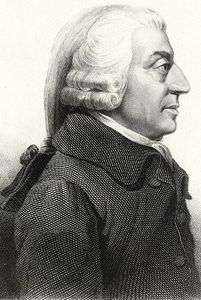Liberty Matters
Encountering 18th Century Sages: A Reply to Brianne Wolf
 Michael Polanyi (1959) speaks of one of science's most important instruments: "we need reverence to perceive greatness, even as we need a telescope to observe spiral nebulae" (96). I think that Brianne shares my strong inclination to use that instrument in examining Hume and Smith. But I feel such inclination to use that instrument in examining Burke as well, more so than Brianne does. She maintains that "it is necessary to separate Hume and Smith from Burke." Brianne says that Hume and Smith "recognized the potential dangers of hard and fast doctrines," as though the same could not be said of Burke.
Michael Polanyi (1959) speaks of one of science's most important instruments: "we need reverence to perceive greatness, even as we need a telescope to observe spiral nebulae" (96). I think that Brianne shares my strong inclination to use that instrument in examining Hume and Smith. But I feel such inclination to use that instrument in examining Burke as well, more so than Brianne does. She maintains that "it is necessary to separate Hume and Smith from Burke." Brianne says that Hume and Smith "recognized the potential dangers of hard and fast doctrines," as though the same could not be said of Burke.I just wrote, "I feel such inclination..." An exploration of one's feelings begins with a useful contrast. Brianne and I need to compare and contrast our feelings over a beer—another ingredient to good science.
Brianne provides a lengthy Burke quotation from 1774 and another from the Philosophical Enquiry into the Origin of Our Ideas of the Sublime and Beautiful on "fixed principles" for taste. I see Burke's Enquiry remarks are saying merely that even when you and I find that we have aesthetic estimations that disagree, we may nonetheless find mutual conformance to certain general principles; there will be some commonality to our sensibilities, even if we disagree on this particular matter. Burke is saying that the rules from which our aesthetic estimations emerge are loose, vague, and indeterminate, but that does not mean that they are purely arbitrary. They are not pure caprice, whim, fancy. Brianne says that, unlike Hume and Smith, "Burke was in search of a fixed standard," but I don't see here a difference among the troika.
Burke's distinction between the sublime and the beautiful, for example, could be a useful device for understanding both Jim's estimation of an object and Mary's; and Jim and Mary might both agree that Burke's distinction is useful in that way. Thus we excavate some commonality between their sensibilities. But I would not say that Burke's distinction points to any hard and fast doctrine—quite the contrary.
What Brianne says about Smith and Hume, highlighting their appreciation of conversation as a process for exploring and developing standards of taste, I fully endorse, but I don't see much reason to suppose differently with respect to Burke.
I appreciate the attention Brianne brings to the early TMS chapter in which Smith suggests that emotional circumstances vary as to whether our relationship to the object under discussion is in any way "peculiar," that is, whether my relation to it differs from your relation to it. Notice that Smith gives as examples of objects where no such "peculiar" relation exists "a picture, or a poem, or a system of philosophy" (21.5), and that when Smith exposits what I dub estimative justice he uses "a poem or a picture" (270.10), perhaps quietly suggesting that we see "a system of philosophy" here too. Smith encourages us to estimate a system of philosophy as though it bore no peculiar relation to ourselves. He wants us to maintain a vigilance against our own creeping superstition, fanaticism, dogmatism and groupthink. All of those are pejorative, and different from Burke's "prejudice." Burke writes: "Prejudice renders a man's virtue his habit; and not a series of unconnected acts. Through just prejudice, his duty becomes a part of his nature" (Refl., 182; italics added). A prejudice can be distributively and estimatively just. Indeed, developing juster prejudices is the greater part of virtue.
I have noted that policy liberalism is primary in conservative liberalism. Brianne asks: "does the concern for liberal policies remain primary over the concern to preserve the polity?" If by "preserve the polity" Brianne means preserve it from utter collapse or dissolution, then I think the question moves beyond some of my presuppositions. Our polities simply are not in danger of utter collapse or dissolution. In this respect I think that our times are not so different from those of Hume, Smith, and Burke. If we faced very different circumstances, then conservative liberalism might be much less apropos.
References
Polanyi, Michael. 1959. The Study of Man. Chicago: University of Chicago Press.
Copyright and Fair Use Statement
“Liberty Matters” is the copyright of Liberty Fund, Inc. This material is put on line to further the educational goals of Liberty Fund, Inc. These essays and responses may be quoted and otherwise used under “fair use” provisions for educational and academic purposes. To reprint these essays in course booklets requires the prior permission of Liberty Fund, Inc. Please contact oll@libertyfund.org if you have any questions.